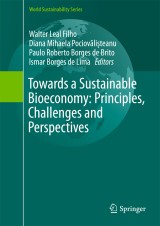Details

Towards a Sustainable Bioeconomy: Principles, Challenges and Perspectives
World Sustainability Series
|
255,73 € |
|
| Verlag: | Springer |
| Format: | |
| Veröffentl.: | 19.01.2018 |
| ISBN/EAN: | 9783319730288 |
| Sprache: | englisch |
Dieses eBook enthält ein Wasserzeichen.
Beschreibungen
<div>This book gathers contributions from scientists and industry representatives on achieving a sustainable bioeconomy. It also covers the social sciences, economics, business, education and the environmental sciences. There is an urgent need to optimise and maximise the use of biological resources, so that primary production and processing systems can generate more food, fibre and other bio-based products with less environmental impacts and lower greenhouse gas emissions. In other words, we need a “sustainable bioeconomy” – a term that encompasses the sustainable production of renewable resources from land, fisheries and aquaculture environments and their conversion into food, feed, fibre bio-based products and bio-energy, as well as related public goods.</div><div> </div><div>Despite the relevance of achieving a sustainable bioeconomy, there are very few publications in this field. Addressing that gap, this book illustrates how biological resources and ecosystems could be used in amore sustainable, efficient and integrated manner – in other words, how the principles of sustainable bioeconomy can be implemented in practice.</div><div> </div><div>Given its interdisciplinary nature, the field of sustainable bioeconomy offers a unique opportunity to address complex and interconnected challenges, while also promoting economic growth. It helps countries and societies to make a transition and to use resources more efficiently, and shows how to rely less on biological resources to satisfy industry demands and consumer needs.</div><div> </div><div>The papers are innovative, cross-cutting and include many practice-based lessons learned, some of which are reproducible elsewhere. In closing, the book, prepared by the Inter-University Sustainable Development Research Programme (IUSDRP) and the World Sustainable Development Research and Transfer Centre (WSD-RTC), reiterates the need to promote a sustainable bioeconomy today.</div>
Fostering Sustainable Bioeconomies: The Role of Conscious Consumption.- Service-Based Bioeconomy – Multilevel Perspective to Assess the Evolving Bioeconomy with a Service Lens.- Environmental Sustainability Indicators for the Bioeconomy.- A Macroeconomic Perspective on Green Growth.- The Biodiversity Finance Initiative: An Approach to Identify and Implement Biodiversity-Centered Finance Solutions for Sustainable Development.- Bioeconomy Opportunities in the Danube Region.- Barriers to Acceptance of Bio-Based Substitutes: How Schema Incongruity can Hinder the Purchase of Bio-Based Products.- Key Factors for the Successful Implementation of Payments for Environmental Services and Offsets for Biodiversity Management and Sustainable Development.<div><br/></div>
<div>This book gathers contributions from scientists and industry representatives on achieving a sustainable bioeconomy. It also covers the social sciences, economics, business, education and the environmental sciences. There is an urgent need to optimise and maximise the use of biological resources, so that primary production and processing systems can generate more food, fibre and other bio-based products with less environmental impacts and lower greenhouse gas emissions. In other words, we need a “sustainable bioeconomy” – a term that encompasses the sustainable production of renewable resources from land, fisheries and aquaculture environments and their conversion into food, feed, fibre bio-based products and bio-energy, as well as related public goods.</div><div> </div><div>Despite the relevance of achieving a sustainable bioeconomy, there are very few publications in this field. Addressing that gap, this book illustrates how biological resources and ecosystems could be used in amore sustainable, efficient and integrated manner – in other words, how the principles of sustainable bioeconomy can be implemented in practice.</div><div> </div><div>Given its interdisciplinary nature, the field of sustainable bioeconomy offers a unique opportunity to address complex and interconnected challenges, while also promoting economic growth. It helps countries and societies to make a transition and to use resources more efficiently, and shows how to rely less on biological resources to satisfy industry demands and consumer needs.</div><div> </div><div>The papers are innovative, cross-cutting and include many practice-based lessons learned, some of which are reproducible elsewhere. In closing, the book, prepared by the Inter-University Sustainable Development Research Programme (IUSDRP) and the World Sustainable Development Research and Transfer Centre (WSD-RTC), reiterates the need to promote a sustainable bioeconomy today.</div>
Covers the social sciences, economics, business, education, and the environmental sciences Comprehensively describes innovations in the field of bioeconomy, filling an important market niche Provides a sound basis for promoting further research and practical efforts in sustainable bioeconomy
Diese Produkte könnten Sie auch interessieren:

Decision Support Systems for Risk-Based Management of Contaminated Sites

von: Antonio Marcomini, Glenn Walter Suter II, Andrea Critto

96,29 €

Dynamics of Mercury Pollution on Regional and Global Scales

von: Nicola Pirrone, Kathryn R. Mahaffey

149,79 €














